#edith nesbit
Text
Review: "Evil Roots: Killer Tales of the Botanical Gothic"

Authors: Nathaniel Hawthorne, Arthur Conan Doyle, Lucy H. Hooper, Charlotte Perkins Gilman, H. G. Wells, Edmond Nolcini, M. R. James, Ambrose Bierce, Howard R. Garis, William Hope Hodgson, Edith Nesbit, H. C. McNeile, Abraham Meritt, Emma Vane
Editor: Daisy Butcher
Date: 03/01/2023
Rating: ⭐⭐⭐⭐⭐
________________________________________________________
I think I ordered this book some time during summer, after I accidentally stumbled upon it on an online bookstore. I love anthologies and I love plants, so this title definitely intrigued me enough to order it. I finally decided to read it around Christmas and finished it during a recent trip, so it's officially my first finished book of the year.
"Evil Roots: Killer Tales of the Botanical Gothic" is an interesting anthology of short horror stories by quite a few well-known authors. From the creator of Sherlock Holmes, to the acclaimed writer of "The Yellow Wallpaper", all the way to the legendary H. G. Wells, this collections features some hidden gems of the late 19th and early 20th century. While the stories are certainly old-school, they could still be regarded as timeless classics and masterful creations.
Most stories revolve around the fascination of the exotic - of unknown plants that are in some way dangerous to humans (or other organisms) and which originate from far away places, like South America. There's mentions of exquisite poisonous flowers, murderous liana, mysterious wisteria, and the weirdest of them all - carnivorous plants.
It is interesting just how much the writers and, by default, the general public were fascinated by exotic flora which, in one way or another, transcended the known laws of nature. Plants were considered sedentary, passive, and at the bottom of the food chain, but as new discoveries were being presented and as more people, professionals and amateurs alike, from the western civilization started their expeditions in new places, society was being introduced with oddities that seemingly didn't follow any established rules. So while the horror in this collection is displayed through various flora, the true horror is derived from the simple fact that humans fear what they cannot understand. One of the most frightening things a person, especially a scientist, can experience is realizing that they will never be able to fully predict nature's capability to adapt and to evolve.
Of course, this theme goes hand in hand with the understanding that it is dangerous altering the natural order of things. While this could also be understood as criticism to the human tendency to play god, there isn't much religious commentary throughout the collection. The stories are centered around ecology, evolution, and biology, highlighting how humans shouldn't meddle with something as powerful as nature - which they will never fully understand, let alone be able to control. Even though the writers do create a feeling of dread through the fear of nature, the horror is actually realized through characters that underestimate its abilities and that have the need to disfigure nature in order to measure their own capabilities.
Furthermore, this collection highlights the uncomfortable fascination western civilization had with other cultures. The urge to study new exotic phenomena on their own accord, to test the limits of human science on something they don't fully understand with little to no regard of the laws of nature and the test subject's true needs, is somewhat perverse. These scientists are conducting experiments in uncontrolled environments, and playing with their test-subjects in order to test their own abilities and knowledge. It is a portrayal of poor research. They're acting out of curiosity with little to no regard of the consequences. It is not their subjects that are evil, for they have been brought up and mistreated in an environment completely unnatural to their habitat, but their tormentor, who butchers them through extreme studies. This is usually evident through a secondary character, most often a colleague, who tries to stop the scientist in their mad experiment before it's too late. The horror is, therefore, found in the abuse executed by the brazen oppressor, not in their vicious, abnormal creations.
The fact that the aforementioned themes barely scratch the surface of all the ideas featured in this collection, prove how layered and compelling all the featured stories are. The editor also did a marvelous job with a lovely foreword and an intriguing introduction to each of the authors and their respective work. Of course, as with every short story collection, not all works are equally strong, but "Evil Roots: Killer Tales of the Botanical Gothic" is still a gorgeous anthology and a noteworthy testament to a relatively overlooked category of horror.
#evil roots#evil roots: killer tales of the botanical gothic#daisy butcher#nathaniel hawthorne#arthur conan doyle#lucy h. hooper#lucy h hooper#charlotte perkins gilman#h g wells#edmond nolcini#m. r. james#h. g. wells#ambrose bierce#howard r. garis#howard r garris#william hope hodgson#edith nesbit#h. c. mcneile#m c mcneile#abraham merritt#emma vane#horror#botany#botanical horror#speculative fiction#review#book review#rc2024#2024#reading challenge
42 notes
·
View notes
Text
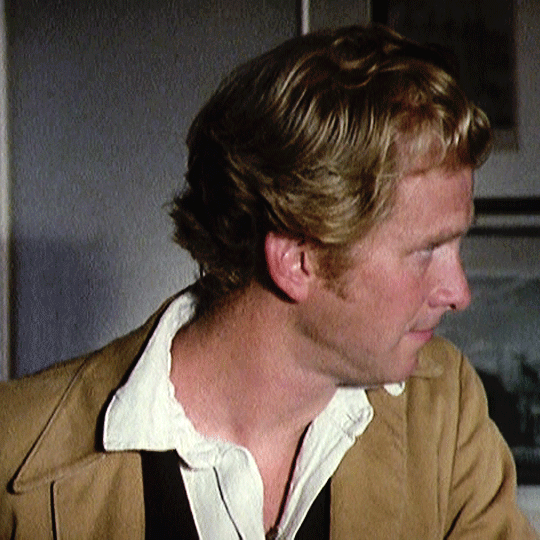



James Wilby in The Treasure Seekers (1996) as Henry Carlisle.
The Scotsman - Tuesday 24 December 1996:
"Henry is a man lost in his own world," says Wilby who plays the character. "He loves to engage the children with his tall stories, but he treats them with respect and doesn't patronise them. He's one of the few adults in the film who treats them as an equal. There's something clever about the way Nesbit creates an interesting story about the adventures of children, that adults enjoy."
-
#James Wilby#The Treasure Seekers#Henry Carlisle#Archived Interviews#Old Interviews#1996#Edith Nesbit#James Wilby Interviews
21 notes
·
View notes
Text
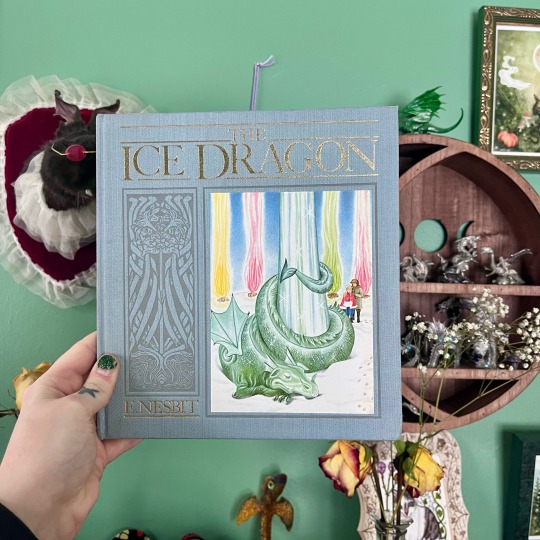
I recently found this copy of The Ice Dragon by E.Nesbit and I’m in love.
10 notes
·
View notes
Text
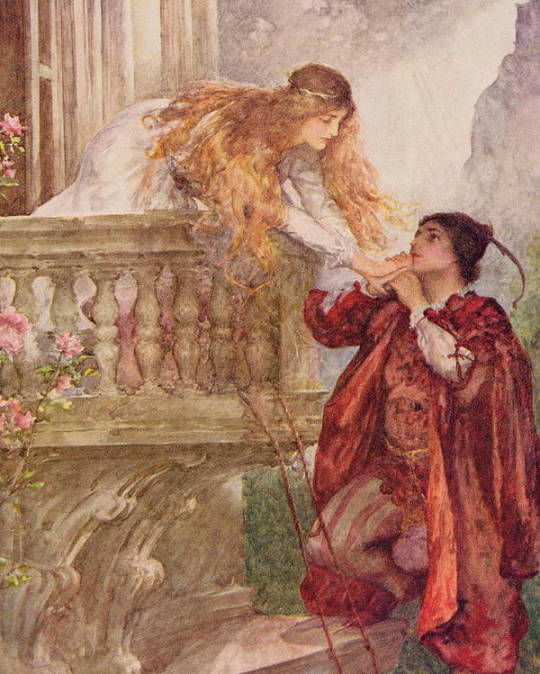
Romeo and Juliet, Edith Nesbit
37 notes
·
View notes
Text
MELISANDE: OR, LONG AND SHORT DIVISION
@adarkrainbow @princesssarisa @autistic-prince-cinderella @the-blue-fairie @themousefromfantasyland @softlytowardthesun @grimoireoffolkloreandfairytales @amalthea9 @angelixgutz @moonbeamelf @parxsisburning @thealmightyemprex @goodanswerfoxmonster @anne-white-star @tamisdava2
(In this comedic literary fairy tale written by Edith Nesbit, takings inspiration from Rapunzel, Gulliver's Travels and Alice's Adventures in Wonderland, a young princess who was cursed to be bald as a baby wishes for long golden hair to appease her Queen Mother, only her hair never stops growing fast, wich is an even messier situation than being bald).
When the Princess Melisande was born, her mother, the Queen, wished to have a christening party, but the King put his foot down and said he would not have it.
“I’ve seen too much trouble come of christening parties,” said he. “However carefully you keep your visiting-book, some fairy or other is sure to get left out, and you know what that leads to. Why, even in my own family, the most shocking things have occurred. The Fairy Malevola was not asked to my great-grandmother’s christening—and you know all about the spindle and the hundred years’ sleep.”
“Perhaps you’re right,” said the Queen. “My own cousin by marriage forgot some stuffy old fairy or other when she was sending out the cards for her daughter’s christening, and the old wretch turned up at the last moment, and the girl drops toads out of her mouth to this day.”
“Just so. And then there was that business of the mouse and the kitchen-maids,” said the King; “we’ll have no nonsense about it. I’ll be her godfather, and you shall be her godmother, and we won’t ask a single fairy; then none of them can be offended.”
“Unless they all are,” said the Queen.
And that was exactly what happened. When the King and the Queen and the baby got back from the christening the parlourmaid met them at the door, and said—
“Please, your Majesty, several ladies have called. I told them you were not at home, but they all said they’d wait.”
“Are they in the parlour?” asked the Queen.
“I’ve shown them into the Throne Room, your Majesty,” said the parlourmaid. “You see, there are several of them.”
There were about seven hundred. The great Throne Room was crammed with fairies, of all ages and of all degrees of beauty and ugliness—good fairies and bad fairies, flower fairies and moon fairies, fairies like spiders and fairies like butterflies—and as the Queen opened the door and began to say how sorry she was to have kept them waiting, they all cried, with one voice, “Why didn’t you ask me to your christening party?”
“I haven’t had a party,” said the Queen, and she turned to the King and whispered, “I told you so.” This was her only consolation.
“You’ve had a christening,” said the fairies, all together.
“I’m very sorry,” said the poor Queen, but Malevola pushed forward and said, “Hold your tongue,” most rudely.
Malevola is the oldest, as well as the most wicked, of the fairies. She is deservedly unpopular, and has been left out of more christening parties than all the rest of the fairies put together.
“Don’t begin to make excuses,” she said, shaking her finger at the Queen. “That only makes your conduct worse. You know well enough what happens if a fairy is left out of a christening party. We are all going to give our christening presents now. As the fairy of highest social position, I shall begin. The Princess shall be bald.”
The Queen nearly fainted as Malevola drew back, and another fairy, in a smart bonnet with snakes in it, stepped forward with a rustle of bats’ wings. But the King stepped forward too.
“No you don’t!” said he. “I wonder at you, ladies, I do indeed. How can you be so unfairylike? Have none of you been to school—have none of you studied the history of your own race? Surely you don’t need a poor, ignorant King like me to tell you that this is no go?”
“How dare you?” cried the fairy in the bonnet, and the snakes in it quivered as she tossed her head. “It is my turn, and I say the Princess shall be——”
The King actually put his hand over her mouth.
“Look here,” he said; “I won’t have it. Listen to reason—or you’ll be sorry afterwards. A fairy who breaks the traditions of fairy history goes out—you know she does—like the flame of a candle. And all tradition shows that only one bad fairy is ever forgotten at a christening party and the good ones are always invited; so either this is not a christening party, or else you were all invited except one, and, by her own showing, that was Malevola. It nearly always is. Do I make myself clear?”
Several of the better-class fairies who had been led away by Malevola’s influence murmured that there was something in what His Majesty said.
“Try it, if you don’t believe me,” said the King; “give your nasty gifts to my innocent child—but as sure as you do, out you go, like a candle-flame. Now, then, will you risk it?”
No one answered, and presently several fairies came up to the Queen and said what a pleasant party it had been, but they really must be going. This example decided the rest. One by one all the fairies said goodbye and thanked the Queen for the delightful afternoon they had spent with her.
“It’s been quite too lovely,” said the lady with the snake-bonnet; “do ask us again soon, dear Queen. I shall be so longing to see you again, and the dear baby,” and off she went, with the snake-trimming quivering more than ever.
When the very last fairy was gone the Queen ran to look at the baby—she tore off its Honiton lace cap and burst into tears. For all the baby’s downy golden hair came off with the cap, and the Princess Melisande was as bald as an egg.
“Don’t cry, my love,” said the King. “I have a wish lying by, which I’ve never had occasion to use. My fairy godmother gave it me for a wedding present, but since then I’ve had nothing to wish for!”
“Thank you, dear,” said the Queen, smiling through her tears.
“I’ll keep the wish till baby grows up,” the King went on. “And then I’ll give it to her, and if she likes to wish for hair she can.”
“Oh, won’t you wish for it now?” said the Queen, dropping mixed tears and kisses on the baby’s round, smooth head.
“No, dearest. She may want something else more when she grows up. And besides, her hair may grow by itself.”
But it never did. Princess Melisande grew up as beautiful as the sun and as good as gold, but never a hair grew on that little head of hers. The Queen sewed her little caps of green silk, and the Princess’s pink and white face looked out of these like a flower peeping out of its bud. And every day as she grew older she grew dearer, and as she grew dearer she grew better, and as she grew more good she grew more beautiful.
Now, when she was grown up the Queen said to the King—
“My love, our dear daughter is old enough to know what she wants. Let her have the wish.”
So the King wrote to his fairy godmother and sent the letter by a butterfly. He asked if he might hand on to his daughter the wish the fairy had given him for a wedding present.
“I have never had occasion to use it,” said he, “though it has always made me happy to remember that I had such a thing in the house. The wish is as good as new, and my daughter is now of an age to appreciate so valuable a present.”
To which the fairy replied by return of butterfly:—
“Dear King,—Pray do whatever you like with my poor little present. I had quite forgotten it, but I am pleased to think that you have treasured my humble keepsake all these years.
“Your affectionate godmother,
“Fortuna F.”
So the King unlocked his gold safe with the seven diamond-handled keys that hung at his girdle, and took out the wish and gave it to his daughter.
[168]
And Melisande said: “Father, I will wish that all your subjects should be quite happy.”
But they were that already, because the King and Queen were so good. So the wish did not go off.
So then she said: “Then I wish them all to be good.”
But they were that already, because they were happy. So again the wish hung fire.
Then the Queen said: “Dearest, for my sake, wish what I tell you.”
“Why, of course I will,” said Melisande. The Queen whispered in her ear, and Melisande nodded. Then she said, aloud—
“I wish I had golden hair a yard long, and that it would grow an inch every day, and grow twice as fast every time it was cut, and——”
“Stop,” cried the King. And the wish went off, and the next moment the Princess stood smiling at him through a shower of golden hair.
“Oh, how lovely,” said the Queen. “What a pity you interrupted her, dear; she hadn’t finished.”
“What was the end?” asked the King.
“Oh,” said Melisande, “I was only going to say, ‘and twice as thick.’”
“It’s a very good thing you didn’t,” said the King. “You’ve done about enough.” For he had a mathematical mind, and could do the sums about the grains of wheat on the chess-board, and the nails in the horse’s shoes, in his Royal head without any trouble at all.
“Why, what’s the matter?” asked the Queen.
“You’ll know soon enough,” said the King. “Come, let’s be happy while we may. Give me a kiss, little Melisande, and then go to nurse and ask her to teach you how to comb your hair.”
“I know,” said Melisande, “I’ve often combed mother’s.”
“Your mother has beautiful hair,” said the King; “but I fancy you will find your own less easy to manage.”
And, indeed, it was so. The Princess’s hair began by being a yard long, and it grew an inch every night. If you know anything at all about the simplest sums you will see that in about five weeks her hair was about two yards long. This is a very inconvenient length. It trails on the floor and sweeps up all the dust, and though in palaces, of course, it is all gold-dust, still it is not nice to have it in your hair. And the Princess’s hair was growing an inch every night. When it was three yards long the Princess could not bear it any longer—it was so heavy and so hot—so she borrowed nurse’s cutting-out scissors and cut it all off, and then for a few hours she was comfortable. But the hair went on growing, and now it grew twice as fast as before; so that in thirty-six days it was as long as ever. The poor Princess cried with tiredness; when she couldn’t bear it any more she cut her hair and was comfortable for a very little time. For the hair now grew four times as fast as at first, and in eighteen days it was as long as before, and she had to have it cut. Then it grew eight inches a day, and the next time it was cut it grew sixteen inches a day, and then thirty-two inches and sixty-four inches and a hundred and twenty-eight inches a day, and so on, growing twice as fast after each cutting, till the Princess would go to bed at night with her hair clipped short, and wake up in the morning with yards and yards and yards of golden hair flowing all about the room, so that she could not move without pulling her own hair, and nurse had to come and cut the hair off before she could get out of bed.
“I wish I was bald again,” sighed poor Melisande, looking at the little green caps she used to wear, and she cried herself to sleep o’ nights between the golden billows of the golden hair. But she never let her mother see her cry, because it was the Queen’s fault, and Melisande did not want to seem to reproach her.
When first the Princess’s hair grew her mother sent locks of it to all her Royal relations, who had them set in rings and brooches. Later, the Queen was able to send enough for bracelets and girdles. But presently so much hair was cut off that they had to burn it. Then when autumn came all the crops failed; it seemed as though all the gold of harvest had gone into the Princess’s hair. And there was a famine. Then Melisande said—
“It seems a pity to waste all my hair; it does grow so very fast. Couldn’t we stuff things with it, or something, and sell them, to feed the people?”
So the King called a council of merchants, and they sent out samples of the Princess’s hair, and soon orders came pouring in; and the Princess’s hair became the staple export of that country. They stuffed pillows with it, and they stuffed beds with it. They made ropes of it for sailors to use, and curtains for hanging in Kings’ palaces. They made haircloth of it, for hermits, and other people who wished to be uncomfy. But it was so soft and silky that it only made them happy and warm, which they did not wish to be. So the hermits gave up wearing it, and, instead, mothers bought it for their little babies, and all well-born infants wore little shirts of Princess-haircloth.
And still the hair grew and grew. And the people were fed and the famine came to an end.
Then the King said: “It was all very well while the famine lasted—but now I shall write to my fairy godmother and see if something cannot be done.”
So he wrote and sent the letter by a skylark, and by return of bird came this answer—
“Why not advertise for a competent Prince? Offer the usual reward.”
So the King sent out his heralds all over the world to proclaim that any respectable Prince with proper references should marry the Princess Melisande if he could stop her hair growing.
Then from far and near came trains of Princes anxious to try their luck, and they brought all sorts of nasty things with them in bottles and round wooden boxes. The Princess tried all the remedies, but she did not like any of them, and she did not like any of the Princes, so in her heart she was rather glad that none of the nasty things in bottles and boxes made the least difference to her hair.
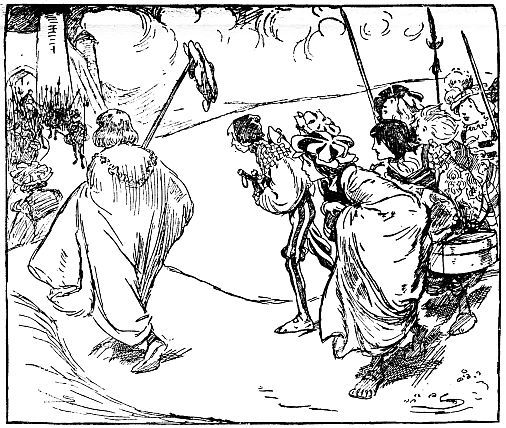
The Princess had to sleep in the great Throne Room now, because no other room was big enough to hold her and her hair. When she woke in the morning the long high room would be quite full of her golden hair, packed tight and thick like wool in a barn. And every night when she had had the hair cut close to her head she would sit in her green silk gown by the window and cry, and kiss the little green caps she used to wear, and wish herself bald again.
It was as she sat crying there on Midsummer Eve that she first saw Prince Florizel.
He had come to the palace that evening, but he would not appear in her presence with the dust of travel on him, and she had retired with her hair borne by twenty pages before he had bathed and changed his garments and entered the reception-room.
Now he was walking in the garden in the moonlight, and he looked up and she looked down, and for the first time Melisande, looking on a Prince, wished that he might have the power to stop her hair from growing. As for the Prince, he wished many things, and the first was granted him. For he said—
“You are Melisande?”
“And you are Florizel?”
“There are many roses round your window,” said he to her, “and none down here.”
She threw him one of three white roses she held in her hand. Then he said—
“White rose trees are strong. May I climb up to you?”
“Surely,” said the Princess.
So he climbed up to the window.
“Now,” said he, “if I can do what your father asks, will you marry me?”
“My father has promised that I shall,” said Melisande, playing with the white roses in her hand.
“Dear Princess,” said he, “your father’s promise is nothing to me. I want yours. Will you give it to me?”
“Yes,” said she, and gave him the second rose.
“I want your hand.”
“Yes,” she said.
“And your heart with it.”
“Yes,” said the Princess, and she gave him the third rose.
“And a kiss to seal the promise.”
“Yes,” said she.
“And a kiss to go with the hand.”
“Yes,” she said.
“And a kiss to bring the heart.”
“Yes,” said the Princess, and she gave him the three kisses.
“Now,” said he, when he had given them back to her, “to-night do not go to bed. Stay by your window, and I will stay down here in the garden and watch. And when your hair has grown to the filling of your room call to me, and then do as I tell you.”
“I will,” said the Princess.
So at dewy sunrise the Prince, lying on the turf beside the sun-dial, heard her voice—
“Florizel! Florizel! My hair has grown so long that it is pushing me out of the window.”
“Get out on to the window-sill,” said he, “and twist your hair three times round the great iron hook that is there.”
And she did.
Then the Prince climbed up the rose bush with his naked sword in his teeth, and he took the Princess’s hair in his hand about a yard from her head and said—
“Jump!”
The Princess jumped, and screamed, for there she was hanging from the hook by a yard and a half of her bright hair; the Prince tightened his grasp of the hair and drew his sword across it.
Then he let her down gently by her hair till her feet were on the grass, and jumped down after her.
They stayed talking in the garden till all the shadows had crept under their proper trees and the sun-dial said it was breakfast time.
Then they went in to breakfast, and all the Court crowded round to wonder and admire. For the Princess’s hair had not grown.
“How did you do it?” asked the King, shaking Florizel warmly by the hand.
“The simplest thing in the world,” said Florizel, modestly. “You have always cut the hair off the Princess. I just cut the Princess off the hair.”
“Humph!” said the King, who had a logical mind. And during breakfast he more than once looked anxiously at his daughter. When they got up from breakfast the Princess rose with the rest, but she rose and rose and rose, till it seemed as though there would never be an end of it. The Princess was nine feet high.
“I feared as much,” said the King, sadly. “I wonder what will be the rate of progression. You see,” he said to poor Florizel, “when we cut the hair off it grows—when we cut the Princess off she grows. I wish you had happened to think of that!”
The Princess went on growing. By dinner-time she was so large that she had to have her dinner brought out into the garden because she was too large to get indoors. But she was too unhappy to be able to eat anything. And she cried so much that there was quite a pool in the garden, and several pages were nearly drowned. So she remembered her “Alice in Wonderland,” and stopped crying at once. But she did not stop growing. She grew bigger and bigger and bigger, till she had to go outside the palace gardens and sit on the common, and even that was too small to hold her comfortably, for every hour she grew twice as much as she had done the hour before. And nobody knew what to do, nor where the Princess was to sleep. Fortunately, her clothes had grown with her, or she would have been very cold indeed, and now she sat on the common in her green gown, embroidered with gold, looking like a great hill covered with gorse in flower.
You cannot possibly imagine how large the Princess was growing, and her mother stood wringing her hands on the castle tower, and the Prince Florizel looked on broken-hearted to see his Princess snatched from his arms and turned into a lady as big as a mountain.
The King did not weep or look on. He sat down at once and wrote to his fairy godmother, asking her advice. He sent a weasel with the letter, and by return of weasel he got his own letter back again, marked “Gone away. Left no address.”
It was now, when the kingdom was plunged into gloom, that a neighbouring King took it into his head to send an invading army against the island where Melisande lived. They came in ships and they landed in great numbers, and Melisande looking down from her height saw alien soldiers marching on the sacred soil of her country.
“I don’t mind so much now,” said she, “if I can really be of some use this size.”
And she picked up the army of the enemy in handfuls and double-handfuls, and put them back into their ships, and gave a little flip to each transport ship with her finger and thumb, which sent the ships off so fast that they never stopped till they reached their own country, and when they arrived there the whole army to a man said it would rather be courtmartialled a hundred times over than go near the place again.

Meantime Melisande, sitting on the highest hill on the island, felt the land trembling and shivering under her giant feet.
“I do believe I’m getting too heavy,” she said, and jumped off the island into the sea, which was just up to her ankles. Just then a great fleet of warships and gunboats and torpedo boats came in sight, on their way to attack the island.
Melisande could easily have sunk them all with one kick, but she did not like to do this because it might have drowned the sailors, and besides, it might have swamped the island.
So she simply stooped and picked the island as you would pick a mushroom—for, of course, all islands are supported by a stalk underneath—and carried it away to another part of the world. So that when the warships got to where the island was marked on the map they found nothing but sea, and a very rough sea it was, because the Princess had churned it all up with her ankles as she walked away through it with the island.
When Melisande reached a suitable place, very sunny and warm, and with no sharks in the water, she set down the island; and the people made it fast with anchors, and then every one went to bed, thanking the kind fate which had sent them so great a Princess to help them in their need, and calling her the saviour of her country and the bulwark of the nation.
But it is poor work being the nation’s bulwark and your country’s saviour when you are miles high, and have no one to talk to, and when all you want is to be your humble right size again and to marry your sweetheart. And when it was dark the Princess came close to the island, and looked down, from far up, at her palace and her tower and cried, and cried, and cried. It does not matter how much you cry into the sea, it hardly makes any difference, however large you may be. Then when everything was quite dark the Princess looked up at the stars.
“I wonder how soon I shall be big enough to knock my head against them,” said she.
And as she stood star-gazing she heard a whisper right in her ear. A very little whisper, but quite plain.
“Cut off your hair!” it said.
Now, everything the Princess was wearing had grown big along with her, so that now there dangled from her golden girdle a pair of scissors as big as the Malay Peninsula, together with a pin-cushion the size of the Isle of Wight, and a yard measure that would have gone round Australia.
And when she heard the little, little voice, she knew it, small as it was, for the dear voice of Prince Florizel, and she whipped out the scissors from her gold case and snip, snip, snipped all her hair off, and it fell into the sea. The coral insects got hold of it at once and set to work on it, and now they have made it into the biggest coral reef in the world; but that has nothing to do with the story.
Then the voice said, “Get close to the island,” and the Princess did, but she could not get very close because she was so large, and she looked up again at the stars and they seemed to be much farther off.
Then the voice said, “Be ready to swim,” and she felt something climb out of her ear and clamber down her arm. The stars got farther and farther away, and next moment the Princess found herself swimming in the sea, and Prince Florizel swimming beside her.
“I crept on to your hand when you were carrying the island,” he explained, when their feet touched the sand and they walked in through the shallow water, “and I got into your ear with an ear-trumpet. You never noticed me because you were so great then.”
“Oh, my dear Prince,” cried Melisande, falling into his arms, “you have saved me. I am my proper size again.”
So they went home and told the King and Queen. Both were very, very happy, but the King rubbed his chin with his hand, and said—
“You’ve certainly had some fun for your money, young man, but don’t you see that we’re just where we were before? Why, the child’s hair is growing already.”
And indeed it was.
Then once more the King sent a letter to his godmother. He sent it by a flying-fish, and by return of fish come the answer—
“Just back from my holidays. Sorry for your troubles. Why not try scales?”
And on this message the whole Court pondered for weeks.
But the Prince caused a pair of gold scales to be made, and hung them up in the palace gardens under a big oak tree. And one morning he said to the Princess—
“My darling Melisande, I must really speak seriously to you. We are getting on in life. I am nearly twenty: it is time that we thought of being settled. Will you trust me entirely and get into one of those gold scales?”
So he took her down into the garden, and helped her into the scale, and she curled up in it in her green and gold gown, like a little grass mound with buttercups on it.
“And what is going into the other scale?” asked Melisande.
“Your hair,” said Florizel. “You see, when your hair is cut off you it grows, and when you are cut off your hair you grow—oh, my heart’s delight, I can never forget how you grew, never! But if, when your hair is no more than you, and you are no more than your hair, I snip the scissors between you and it, then neither you nor your hair can possibly decide which ought to go on growing.”
“Suppose both did,” said the poor Princess, humbly.
“Impossible,” said the Prince, with a shudder; “there are limits even to Malevola’s malevolence. And, besides, Fortuna said ‘Scales.’ Will you try it?”
“I will do whatever you wish,” said the poor Princess, “but let me kiss my father and mother once, and Nurse, and you, too, my dear, in case I grow large again and can kiss nobody any more.”
So they came one by one and kissed the Princess.
Then the nurse cut off the Princess’s hair, and at once it began to grow at a frightful rate.
The King and Queen and nurse busily packed it, as it grew, into the other scale, and gradually the scale went down a little. The Prince stood waiting between the scales with his drawn sword, and just before the two were equal he struck. But during the time his sword took to flash through the air the Princess’s hair grew a yard or two, so that at the instant when he struck the balance was true.
“You are a young man of sound judgment,” said the King, embracing him, while the Queen and the nurse ran to help the Princess out of the gold scale.
The scale full of golden hair bumped down on to the ground as the Princess stepped out of the other one, and stood there before those who loved her, laughing and crying with happiness, because she remained her proper size, and her hair was not growing any more.
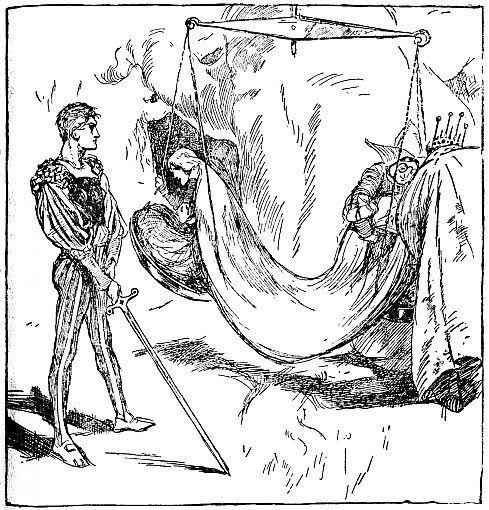
She kissed her Prince a hundred times, and the very next day they were married. Every one remarked on the beauty of the bride, and it was noticed that her hair was quite short—only five feet five and a quarter inches long—just down to her pretty ankles. Because the scales had been ten feet ten and a half inches apart, and the Prince, having a straight eye, had cut the golden hair exactly in the middle!
Source:
24 notes
·
View notes
Text
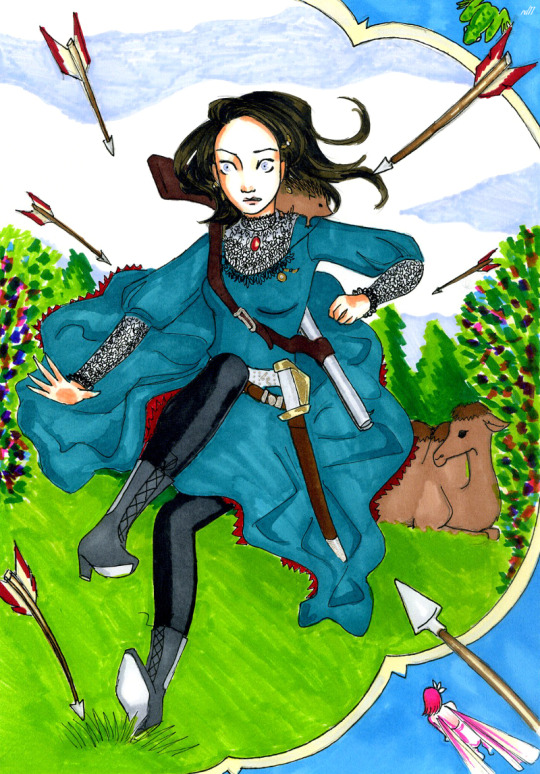
Fan art for "The Princess and the Hedge-pig", one of many original fairy tales by the brilliant early twentieth-century fantasy author E Nesbit. So many of Nesbit's fairy tales are fun and funny and clever, but Hedge-pig (just another name for a hedgehog) has long been my favorite. Our heroine, the Princess Ozyliza, who can fight and shoot as well as any Prince Charming, is ousted from her throne. Her enemies attempt to assassinate her with a barrage of arrows. But her childhood friend, a strapping young baker's apprentice, throws himself in the line of fire, is repeatedly impaled in the back, and, to save his life, a good fairy turns him into a hedgehog. From there, they set out to win back her kingdom.
Nesbit often writes with an eye for humor, so I wanted to capture a bit of silliness in this.
#ozyliza#the princess and the hedge-pig#hedgehog#e nesbit#edith nesbit#fairy tale#benevola#malevola#(the fairy and the toad)#2011
2 notes
·
View notes
Text

Leo Tolstoy, War and Peace
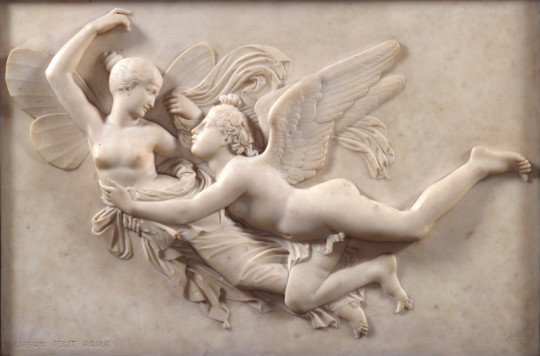
John Gibson, Cupid pursuing Psyche (1853) - part of the series Cupid and Psyche

Edith Nesbit, The Poet To His Love

Victor Hugo, Les Misérables

@sufisoulselective, 'Love is a bird'

Titanic (1997) dir. James Cameron

Mehmed Murat Ildan

Dolly Parton, Love Is Like a Butterfly

Ever After (1998) dir. Andy Tennant
#webs#web weaving#topic: love#image described#image description in alt text#mine#remake#leo tolstoy#john gibson#edith nesbit#victor hugo#@sufisoulselective#titanic (1997)#mehmet murat ildan#dolly parton#ever after (1998)
6 notes
·
View notes
Text
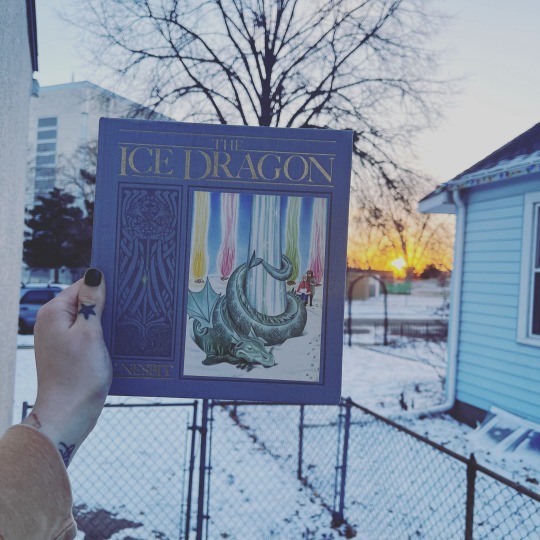
🧊 The Ice Dragon by E. Nesbit and Carole Grey
Rating: ⭐️⭐️⭐️/5
In this story for children, George and Jane adventure to the North Pole when curious about the Northern Lights, but soon find a dragon and wicked seal-skin dwarves.
A fun and imaginative story about the North Pole that feels perfect for the low temperatures at the moment. I wish the dragon played a bigger part in the story, since the story IS named after him, but I thought this was still entertaining to read.
#godzilla reads#the ice dragon#e Nesbit#Edith Nesbit#book review#bookish#book blog#dragon books#winter books#book dragon#booklr#bookworm#booklover#bibliophile
4 notes
·
View notes
Text
2023 Reading Challenge. Children’s Lit: The Railway Children by E. Nesbit
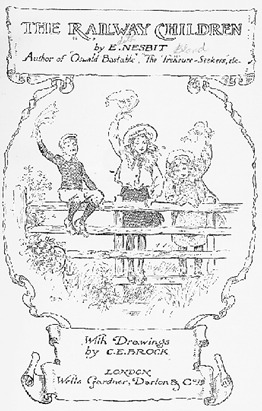
Lionel Jeffries 1970 adaptation of The Railway Children was a film that I watched a lot as a kid. Despite this, and despite watching several other adaptations, including a stage production, I never read the book, either when I was a child, or as an adult – until now, that is. I really don’t know why I never read it, it’s just the book I would have loved as a kid.
If you’re unfamiliar with the book, the premise is as follows: three siblings, Roberta (or Bobbie, hey kind of like me!), Peter and Phyllis live in middle-class, suburban London with their kind and adoring parents, one day their father is forced to leave the family for reasons that initially are not disclosed to the children, and consequently, the children and their mother move from London to 'The Three Chimneys', a cottage in Yorkshire, close to the railway. Due to their proximity to the railway and to the train station, the children develop an affinity for trains and the people associated with them (including the station porter Mr Perks, who the children befriend, and The Old Gentleman, a man who frequently travels by train and waves at them). The book is largely episodic, with most of the chapters telling self-contained stories about the children’s many adventures. Despite this quaint-sounding premise, there are references to more mature themes present within the book. The book was published in 1906, but is set the previous year, with the book containing several references to the then-current Russo-Japanese War (indeed, without giving too much away, the reason for the children’s father’s abrupt departure at the beginning of the book is directly related to this).
Much like other classic children’s literature, one of the major strengths of this book is the children themselves, who all feel so full of life and distinct from one another.
As much as I enjoyed this book, I feel like I don’t have all that much to say about it. It is a classic after all, and highly regarded, definitely worth a read, if you haven’t read it already (regardless of if you’re a child or an adult), and if you have read the book but haven’t watched the 1970 film adaptation then I recommend that as well, as it’s an extremely faithful adaptation that captures the spirit and tone of the book very well.
4 notes
·
View notes
Text
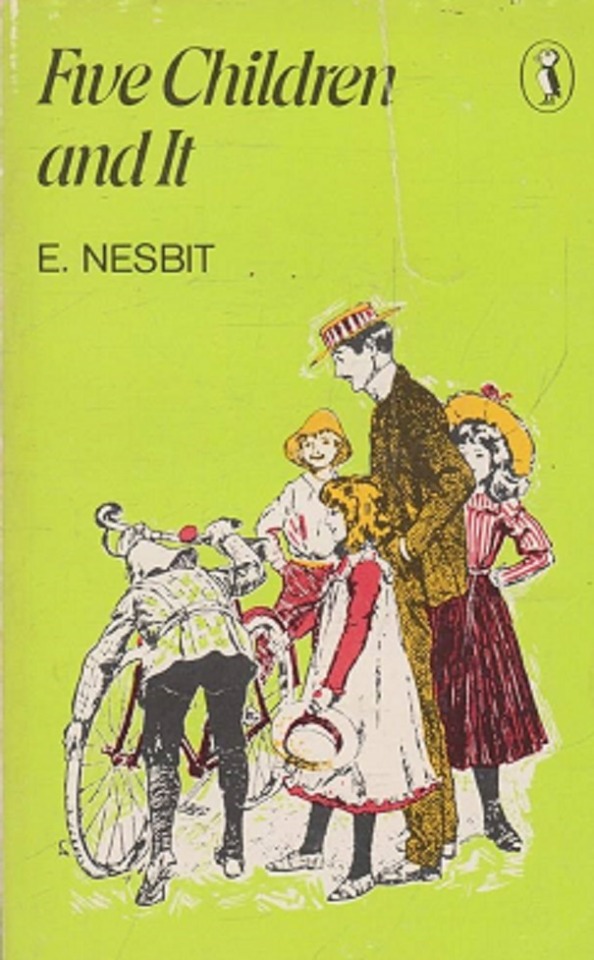
Five Children And It ~ Edith Nesbit
2 notes
·
View notes
Text

JOMP Book Photo Challenge || May || 17 || Favorite Bookstore
#jompbpc#justonemorepage#book photo challenge#bookshop#bookstore#spooky reads#short stories#frances hodgson burnett#edith nesbit#leonora carrington#Mary E. Braddon#horror fiction#ghost stories#booklr#bookmarks#bookmark#bookblr#leerreadinglire
5 notes
·
View notes
Text
His lips victorious that mocked my pain,
And I mourned in the cold and the outer night,
And my tears and my prayers were vain.
#poetry#spilled poetry#edith nesbit#poem excerpt#excerpts of Edith nesbit#poets corner#prayer#efforts in vain
4 notes
·
View notes
Text

The choice for illustration fell on my favourite childhood writer Edith Nesbit and her work "The Princess and the Hedgehog", where the world of magic and chivalry reigns 🦔💘
#illustration#character design#art#digital art#punkstyle#punkart#punk fashion#knight#medieval art#medieval aesthetic#armor#edith nesbit#arrow#fairy tale illustration#fairytale#artists on tumblr#medievalist#concept art#iroquois#mohawk#procreate#design#fanart
6 notes
·
View notes
Text

"There are brown eyes in the world, after all, as well as blue, and one pair of brown that meant heaven to me as the blue had never done."
Edith Nesbit
2 notes
·
View notes
Text
In the deep heart of furthest fairyland
Where foot of man has never trodden yet
The enchanted portals of her palace stand,
And there her sleepless sentinels are set.
All round grow forests of white eglantine
And drooping, dreaming clematis; there blows
The purple nightshade; there pale bindweeds twine
And there the pale, frail flower of slumber grows.
Her palaces are decked with gleaming wings,
Hung o’er with webs through spacious bower and hall,
Filled through and through with precious priceless things;
She is their mistress and she hates them all.
No darkling webs, woven in dust and gloom,
Adorn her palace walls; there gleam astir
Live threads of light, spun for a fairy’s loom,
And stolen by her slaves and brought to her.
She wears a robe woven of the July sun,
Mixed with green threads won from the East at dawn,
Bordered with silver moonrays, finely spun,
And gemmed with glowworms from some shadowy lawn.
She wears a crown of dewdrops bright like tears,
Her girdle is a web of rainbow dyes;
She knows no youth, nor age; the hours and years
Leave never a shadow on her lips and eyes.
In magic rings of green and glistening light
Her fairies dance, in star-spun raiment clad,
Her people do her bidding day and night,
Her dark-robed servants toil to make her glad.
Her minstrels play to her—her singers raise
Soft songs, more sweet than man has ever heard,
With endless rhythms of love her courtiers praise,
And all their heart is in their every word.
She is the mistress of all things that set
Snare of fine webs to win their hearts’ desire,
Queen of all folk who weave the death-strong net
Between the poppy and the wild-rose briar.
Yet sits despair upon that brow of hers,
And sorrow in her eyes makes festival;
The soul of grief with her sad soul confers,
And she sits lonely in her crowded hall;
Because she has woven a web of her bright hair—
A tear-bright web, to catch one soul; and he
Beheld her, in her beauty, set the snare,
And seeing laughed, and laughing passed out free!
The Spider Queen by Edith Nesbit
4 notes
·
View notes
Text
Cold is the wind - the flowers below,
Fearful of winter's hand, lie curled;
But Spring will come again you know,
And glorify the world.
Dark is the night - no stars or moon;
But at its blackest, night is done,
All after hastens to the noon,
The triumph of the sun.
And life is sad, and love is brief.
Be patient ; there will be, they say,
New life, divine beyond belief,
Somehow, somewhere, some day.
– On Dit, Edith Nesbit
0 notes